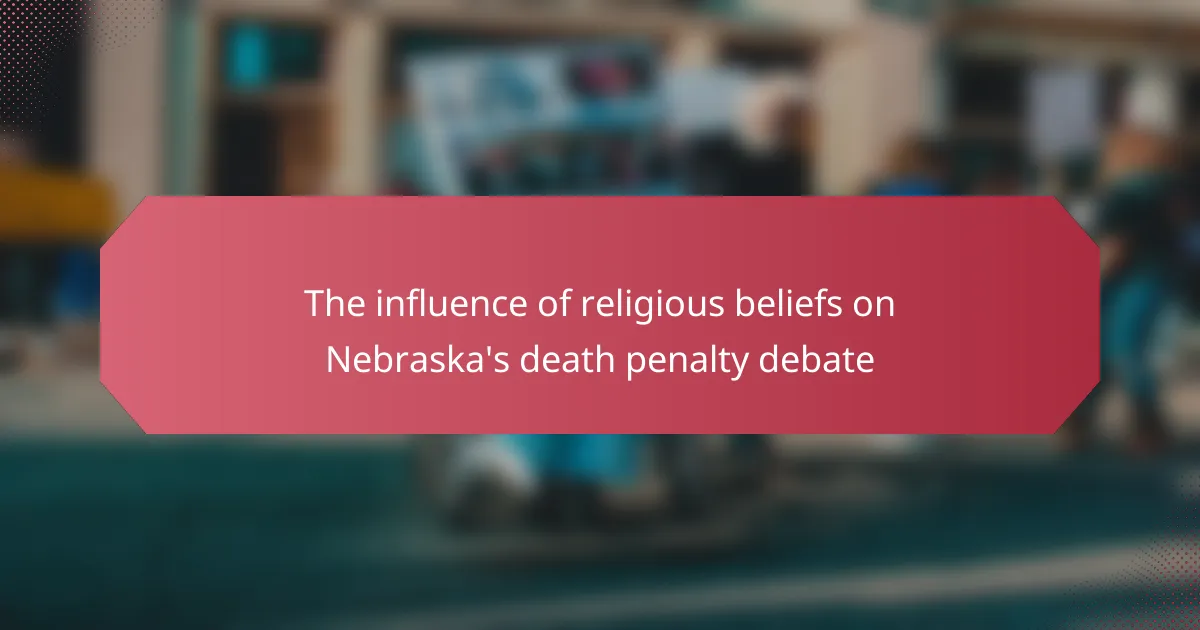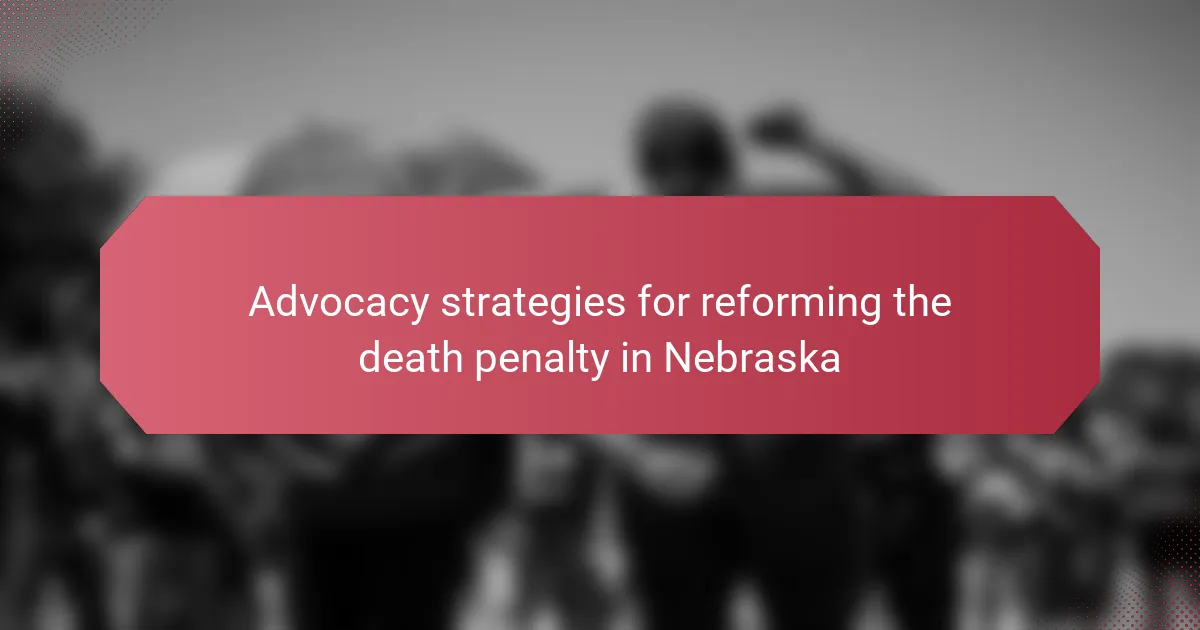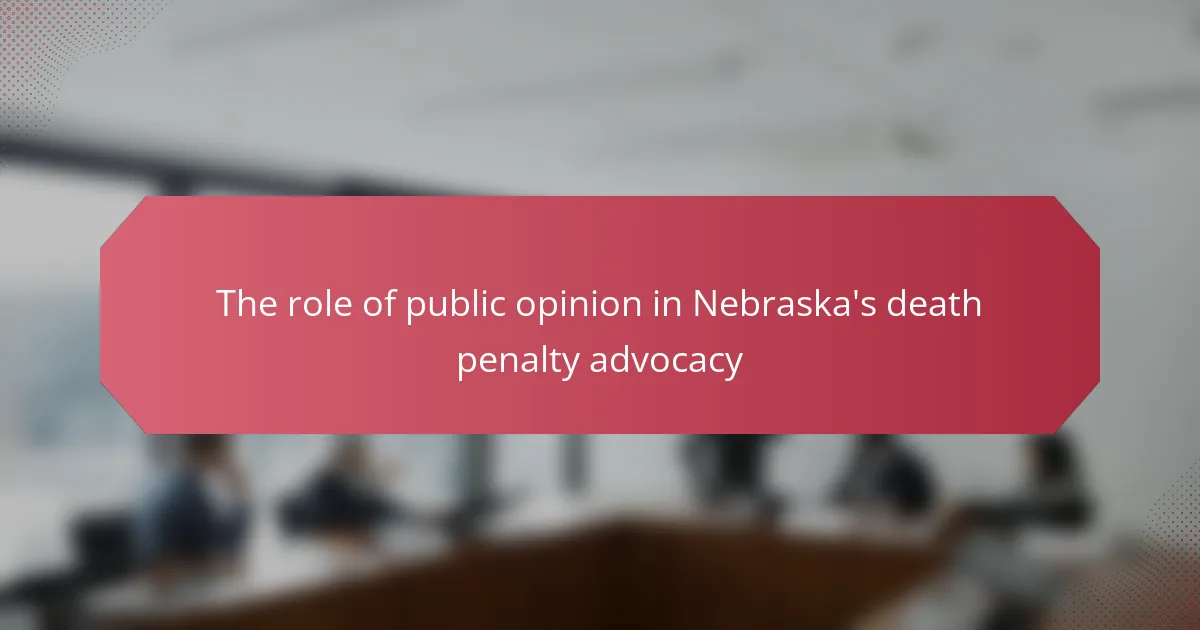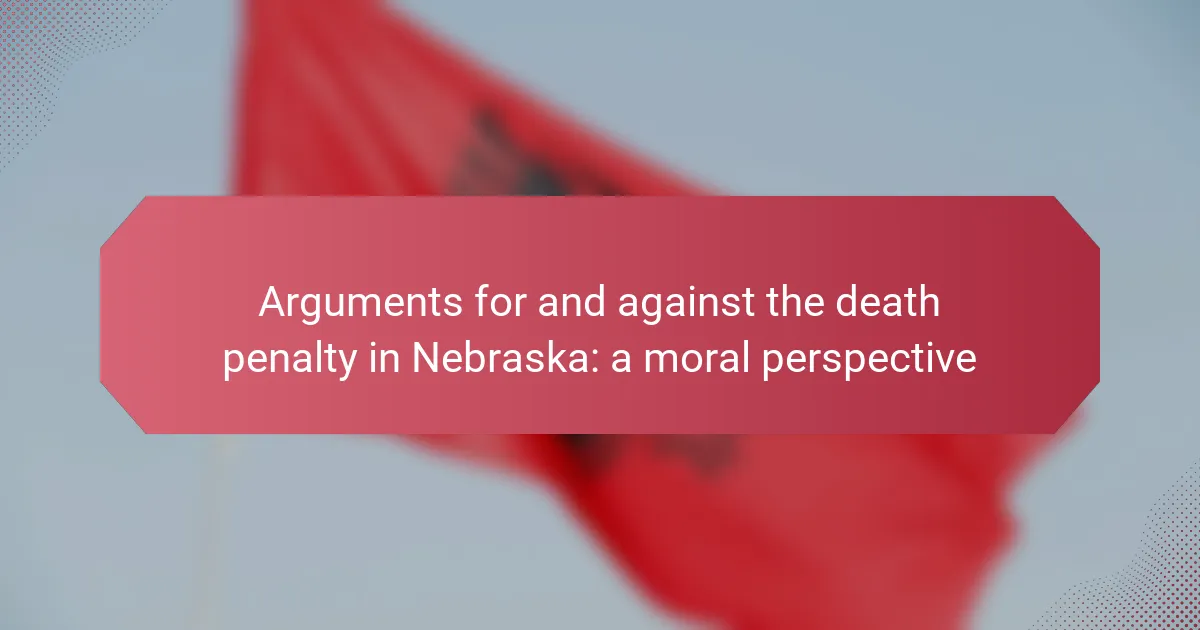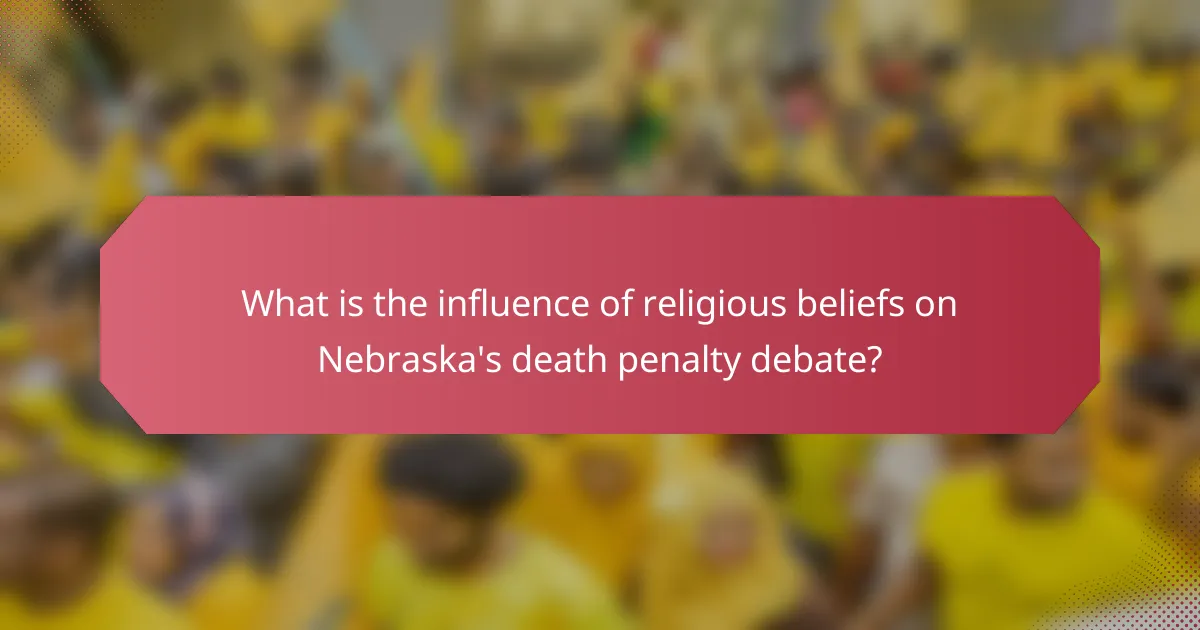
What is the influence of religious beliefs on Nebraska’s death penalty debate?
Religious beliefs significantly influence Nebraska’s death penalty debate. Many religious groups oppose the death penalty, citing the sanctity of life. For instance, the Nebraska Catholic Conference advocates for the abolition of capital punishment. They argue that forgiveness and redemption should take precedence over retribution. Additionally, some Protestant denominations emphasize mercy and rehabilitation over punishment. These beliefs shape public opinion and legislative actions regarding the death penalty. In recent years, this influence has contributed to discussions about reforming or repealing the death penalty in Nebraska.
How have religious beliefs shaped public opinion on the death penalty in Nebraska?
Religious beliefs have significantly influenced public opinion on the death penalty in Nebraska. Many religious groups advocate for the sanctity of life, opposing capital punishment as morally wrong. For instance, the Catholic [censured] has consistently opposed the death penalty, emphasizing forgiveness and redemption. This stance resonates with many Nebraskans, shaping their views against state-sanctioned executions. Additionally, various Protestant denominations have expressed similar beliefs, arguing that justice should focus on rehabilitation rather than retribution. Surveys indicate that a substantial portion of the Nebraska population aligns with these religious perspectives. In recent years, this has contributed to legislative efforts to reconsider or abolish the death penalty in the state.
What specific religious doctrines influence views on capital punishment?
[censured], Judaism, and [censured] are the primary religious doctrines influencing views on capital punishment. [censured] often emphasizes forgiveness and redemption, leading some denominations to oppose the death penalty. The Catholic [censured] has officially condemned capital punishment, citing the sanctity of life. Conversely, some Protestant groups support it, referencing biblical passages that advocate for justice. Judaism holds that capital punishment is permissible under certain circumstances, but it is rarely applied. The Talmud outlines strict criteria for its implementation, emphasizing the value of life. [censured] also permits capital punishment, viewing it as a form of justice for severe crimes. However, interpretations vary widely within the Muslim community, with many advocating for mercy and rehabilitation. These doctrines shape the ethical and moral arguments surrounding capital punishment, influencing the debate in Nebraska and beyond.
How do different religious groups in Nebraska perceive the death penalty?
Different religious groups in Nebraska have varied perceptions of the death penalty. Generally, many Christian denominations oppose it, citing the sanctity of life. For instance, the Catholic [censured] advocates for the abolition of the death penalty, emphasizing forgiveness and redemption. In contrast, some evangelical groups support it, viewing it as a form of justice for heinous crimes. Jewish perspectives often focus on the value of life, with many leaders opposing capital punishment. Additionally, Islamic teachings emphasize justice but also advocate for mercy, leading to diverse opinions within the Muslim community. These positions reflect broader theological beliefs and ethical considerations regarding justice and morality in Nebraska.
Why is the death penalty a controversial issue in Nebraska?
The death penalty is a controversial issue in Nebraska due to differing moral and ethical beliefs. Many residents oppose it based on religious convictions that emphasize forgiveness and the sanctity of life. Conversely, others support it as a form of justice for heinous crimes. In 2015, Nebraska’s legislature voted to abolish the death penalty, reflecting a shift in public opinion. However, this decision faced backlash, leading to a voter referendum in 2016 that reinstated it. The debate continues to be influenced by varying interpretations of religious teachings. Organizations and faith leaders on both sides advocate for their positions, further complicating the issue.
What historical events have impacted the death penalty debate in Nebraska?
The death penalty debate in Nebraska has been significantly influenced by several historical events. In 1972, the Nebraska Supreme Court declared the state’s death penalty unconstitutional. This decision led to a moratorium on executions. In 1993, Nebraska reinstated the death penalty, reflecting changing public attitudes. The execution of Robert Williams in 1997 marked the first execution in 38 years. In 2008, the Nebraska Legislature passed a bill to abolish the death penalty, but it was vetoed by the governor. In 2015, the Legislature successfully voted to abolish the death penalty, overriding the governor’s veto. However, in 2016, the state resumed executions with the execution of Michael Ryan. These events illustrate the fluctuating perspectives on capital punishment in Nebraska, often influenced by societal and religious beliefs.
How do legal and ethical considerations intersect with religious beliefs in this debate?
Legal and ethical considerations often intersect with religious beliefs in the debate over the death penalty. Many religious groups oppose the death penalty based on the belief in the sanctity of life. This belief influences ethical arguments against capital punishment, emphasizing forgiveness and redemption. Legal frameworks must also consider these ethical perspectives when formulating policies. In Nebraska, religious beliefs have prompted discussions about the morality of state-sanctioned execution. The intersection of law and religion shapes public opinion and influences legislative decisions. For instance, the Catholic [censured]’s stance against the death penalty reflects broader ethical concerns that challenge legal practices. This dynamic illustrates how deeply held religious beliefs can impact legal and ethical considerations in significant societal debates.
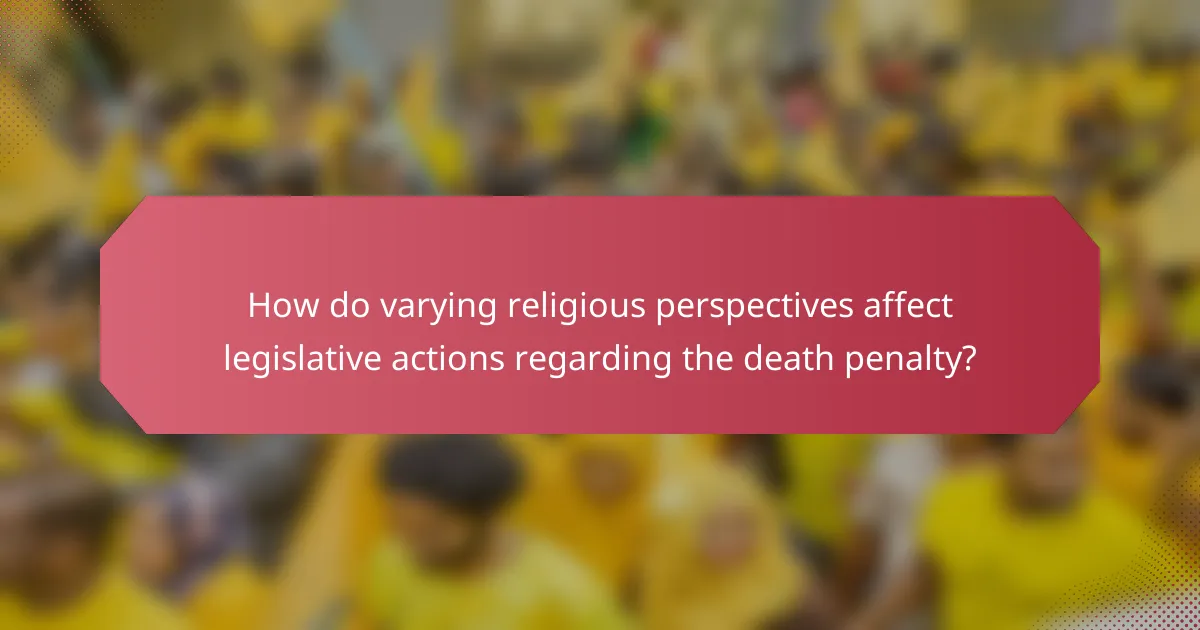
How do varying religious perspectives affect legislative actions regarding the death penalty?
Varying religious perspectives significantly influence legislative actions regarding the death penalty. Different faiths hold distinct views on the sanctity of life and justice. For instance, many Christian denominations advocate for forgiveness and rehabilitation over capital punishment. This belief is rooted in teachings that emphasize mercy, such as those found in the New Testament. Conversely, some interpretations of Islamic law endorse the death penalty for certain crimes, which can lead to support for its application in legal systems.
In Nebraska, the Catholic [censured] has actively campaigned against the death penalty, citing the dignity of human life. This has shaped public opinion and legislative efforts. According to a 2015 survey, 70% of Nebraska Catholics opposed capital punishment. On the other hand, certain evangelical groups may support it, viewing it as a deterrent to crime. These conflicting beliefs create a complex landscape for lawmakers.
As legislators consider bills related to the death penalty, they often weigh these religious perspectives alongside public opinion and moral arguments. This interplay can lead to shifts in policy, as seen in Nebraska’s recent abolition of the death penalty in 2015, influenced by strong advocacy from religious groups.
What role do religious organizations play in advocating for or against the death penalty?
Religious organizations play a significant role in advocating for or against the death penalty. Many religious groups oppose the death penalty, citing the sanctity of life as a core belief. For instance, the Catholic [censured] has officially condemned capital punishment, emphasizing forgiveness and redemption. This stance influences public opinion and legislative actions against the death penalty. Conversely, some religious organizations support it, arguing for justice and retribution. These groups often reference specific biblical passages to justify their position. Their advocacy can shape political discourse and impact policy decisions regarding capital punishment. Overall, religious organizations are pivotal in framing the moral arguments surrounding the death penalty debate.
How have faith-based campaigns influenced legislative outcomes in Nebraska?
Faith-based campaigns have significantly influenced legislative outcomes in Nebraska. These campaigns often mobilize religious communities to advocate for specific policies. For example, in 2015, a coalition of faith leaders successfully campaigned for the repeal of the death penalty. Their efforts included organizing rallies, engaging in public discourse, and lobbying legislators. The campaign emphasized moral arguments against capital punishment, appealing to the ethical beliefs of lawmakers. As a result, the Nebraska legislature voted to abolish the death penalty, reflecting the impact of these faith-based initiatives. This repeal was a historic moment, as it marked a shift in Nebraska’s approach to capital punishment. The influence of faith-based campaigns continues to shape discussions around legislative issues in the state.
What are some notable examples of religious leaders speaking out on this issue?
Notable examples of religious leaders speaking out on Nebraska’s death penalty debate include Bishop James Conley and Rabbi Brian W. Wurtz. Bishop Conley has publicly opposed the death penalty, emphasizing the sanctity of life. He argues that capital punishment contradicts the teachings of [censured]. Rabbi Wurtz has also voiced his opposition, highlighting Jewish values that promote justice without taking life. Their statements reflect a broader religious consensus against the death penalty in Nebraska. This opposition is rooted in ethical beliefs about redemption and forgiveness.
How do individual beliefs impact the views of lawmakers on the death penalty?
Individual beliefs significantly shape lawmakers’ views on the death penalty. Lawmakers often align their stances with personal, moral, and religious convictions. For instance, religious beliefs may lead some lawmakers to oppose capital punishment, viewing it as morally wrong. Conversely, others may support it, believing in justice and deterrence. Research indicates that lawmakers’ decisions can reflect their constituents’ beliefs, creating a feedback loop. In Nebraska, debates often feature religious perspectives influencing legislative discussions. A study by the Pew Research Center highlights that personal beliefs play a crucial role in shaping policy positions on the death penalty.
What personal experiences shape lawmakers’ perspectives on capital punishment?
Lawmakers’ perspectives on capital punishment are shaped by personal experiences such as family history, exposure to crime, and religious beliefs. Family members affected by violent crime may push lawmakers toward supporting capital punishment. Conversely, lawmakers with personal connections to wrongful convictions may oppose it. Religious beliefs often play a significant role in shaping views on life and death. For example, some lawmakers may adhere to doctrines that emphasize forgiveness and redemption. These experiences can lead to a complex interplay of emotions and beliefs regarding justice and punishment. Studies indicate that personal narratives significantly influence legislative decisions on capital punishment.
How do religious affiliations correlate with voting patterns on death penalty legislation?
Religious affiliations significantly influence voting patterns on death penalty legislation. Studies show that individuals with strong religious beliefs often oppose the death penalty. For instance, many Christian denominations advocate for forgiveness and redemption. This belief can lead to a preference for life sentences over capital punishment. Conversely, less religious individuals may support the death penalty as a deterrent to crime. Data from surveys indicate that states with higher populations of religious voters tend to have more restrictive death penalty laws. In Nebraska, for example, religious groups have actively campaigned against the death penalty, impacting legislative outcomes.
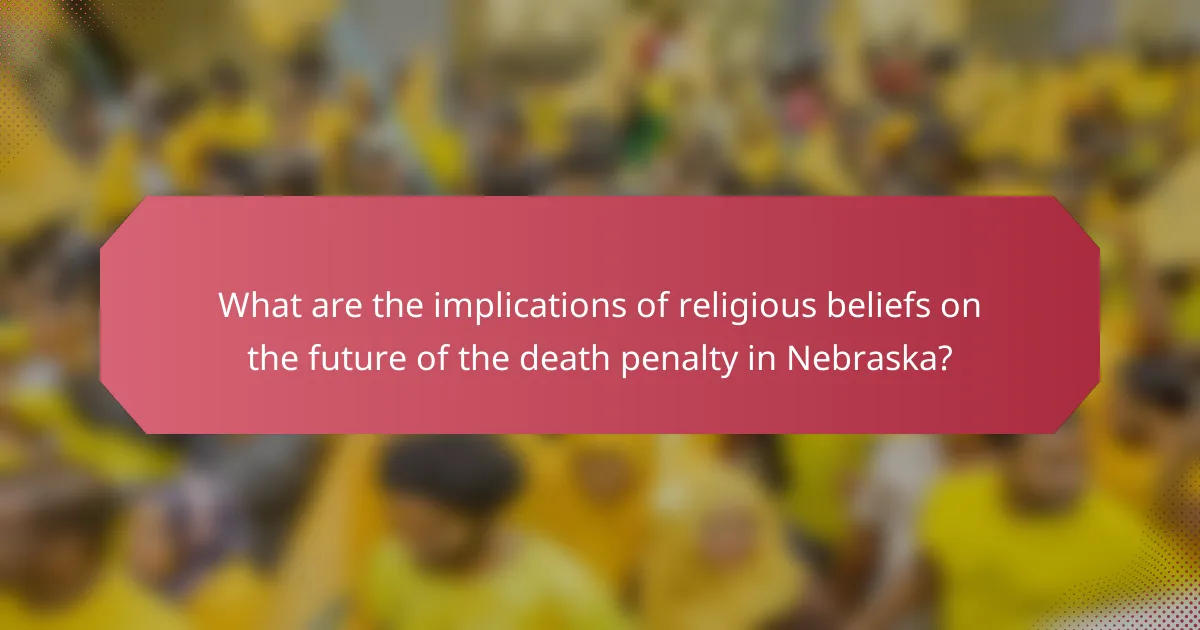
What are the implications of religious beliefs on the future of the death penalty in Nebraska?
Religious beliefs significantly influence the future of the death penalty in Nebraska. Many religious groups advocate for the abolition of capital punishment. They argue that life is sacred and only God has the authority to take it. This perspective can lead to increased public opposition to the death penalty. Additionally, religious leaders often mobilize their congregations to engage in advocacy. This can result in political pressure on lawmakers. In Nebraska, faith-based organizations have actively campaigned for reforms. Their efforts have contributed to changing attitudes towards the death penalty. For instance, a survey indicated that a majority of Nebraska’s population, influenced by religious teachings, favors alternatives to capital punishment.
How might changing religious demographics influence the death penalty debate?
Changing religious demographics can significantly influence the death penalty debate. Different religious groups have varying beliefs about justice and morality. For instance, some faiths advocate for forgiveness and rehabilitation over punishment. This can lead to increased opposition to the death penalty among their adherents.
As religious demographics shift, the values and perspectives of these groups may reshape public opinion. Studies indicate that states with higher populations of certain religious affiliations show differing support for capital punishment. For example, regions with strong evangelical Christian communities may support the death penalty more than those with a predominance of more liberal religious groups.
Additionally, changing demographics can impact political representation and policy-making. Elected officials often align their stances with the beliefs of their constituents. Thus, a shift in religious demographics could lead to legislative changes regarding the death penalty. Historical data shows that states with declining support for the death penalty often correlate with rising populations of more progressive religious groups.
What trends are emerging in religious attitudes towards capital punishment?
Emerging trends in religious attitudes towards capital punishment indicate a growing opposition among many faith groups. Numerous religious organizations are advocating for abolition, citing moral and ethical concerns. For example, the Catholic [censured] has intensified its stance against the death penalty, emphasizing the sanctity of life. Similarly, many Protestant denominations have begun to question its efficacy and morality. Research shows that younger religious individuals are increasingly supportive of reforming or eliminating capital punishment. This shift reflects broader societal changes in views on justice and mercy. Additionally, interfaith coalitions are forming to challenge capital punishment, highlighting a unified moral stance among diverse faiths.
How could interfaith dialogues shape future discussions on the death penalty?
Interfaith dialogues could significantly shape future discussions on the death penalty by fostering understanding and collaboration among diverse religious perspectives. These dialogues can highlight shared values such as compassion, justice, and the sanctity of life. Engaging different faith communities allows for a broader examination of moral and ethical implications surrounding capital punishment.
For instance, religious leaders can share teachings that advocate for forgiveness and rehabilitation rather than retribution. This collective discourse may influence public opinion and policymakers by presenting a united front against the death penalty.
Research shows that interfaith initiatives have successfully altered perceptions on contentious issues in the past. The “Interfaith Coalition Against the Death Penalty” in various states has demonstrated how collaborative efforts can lead to legislative changes. Thus, interfaith dialogues can provide a platform for transformative conversations that may ultimately reshape the narrative around the death penalty.
What practical steps can individuals take to engage in the death penalty debate in Nebraska?
Individuals can engage in the death penalty debate in Nebraska by participating in community discussions. They can attend local forums or town hall meetings focused on the topic. Engaging with local advocacy groups is also beneficial. These groups often have resources and information on the issue. Writing letters to local newspapers can help raise awareness. Individuals can also utilize social media platforms to share their views. Contacting state legislators to express opinions is another effective step. Finally, educating themselves on the legal and ethical aspects of the death penalty will strengthen their arguments. These actions contribute to a more informed and active discussion within the community.
How can citizens advocate for their beliefs regarding the death penalty?
Citizens can advocate for their beliefs regarding the death penalty through various means. They can engage in public discourse by participating in community forums and discussions. Writing letters to local newspapers can also raise awareness about their views. Organizing or joining advocacy groups amplifies their collective voice. Citizens may also contact their elected representatives to express their opinions directly. Volunteering for campaigns that align with their beliefs can further promote their stance. Utilizing social media platforms helps to spread awareness and mobilize support. Research indicates that grassroots movements can significantly influence public policy, as seen in various states’ death penalty reforms.
What resources are available for those looking to understand the religious aspects of this issue?
Resources available for understanding the religious aspects of Nebraska’s death penalty debate include academic articles, books, and faith-based organizations. Scholarly articles often analyze the intersection of religion and law in this context. Books such as “The Death Penalty: A Religious Perspective” provide insights into various religious viewpoints. Faith-based organizations like the Nebraska Catholic Conference offer resources and advocacy materials. Additionally, theological journals may publish discussions on ethics related to capital punishment. These resources collectively shed light on how religious beliefs shape opinions on the death penalty in Nebraska.
The main entity of this article is the influence of religious beliefs on the death penalty debate in Nebraska. The article examines how various religious groups, including the Catholic [censured] and Protestant denominations, shape public opinion and legislative actions regarding capital punishment, emphasizing themes such as the sanctity of life, forgiveness, and rehabilitation. It discusses specific religious doctrines that inform views on the death penalty, notable historical events impacting the debate, and the role of faith-based campaigns in advocating for or against capital punishment. Additionally, the article explores the implications of changing religious demographics and trends in religious attitudes towards the death penalty, providing insights into how these factors may influence future discussions and legislative outcomes.
